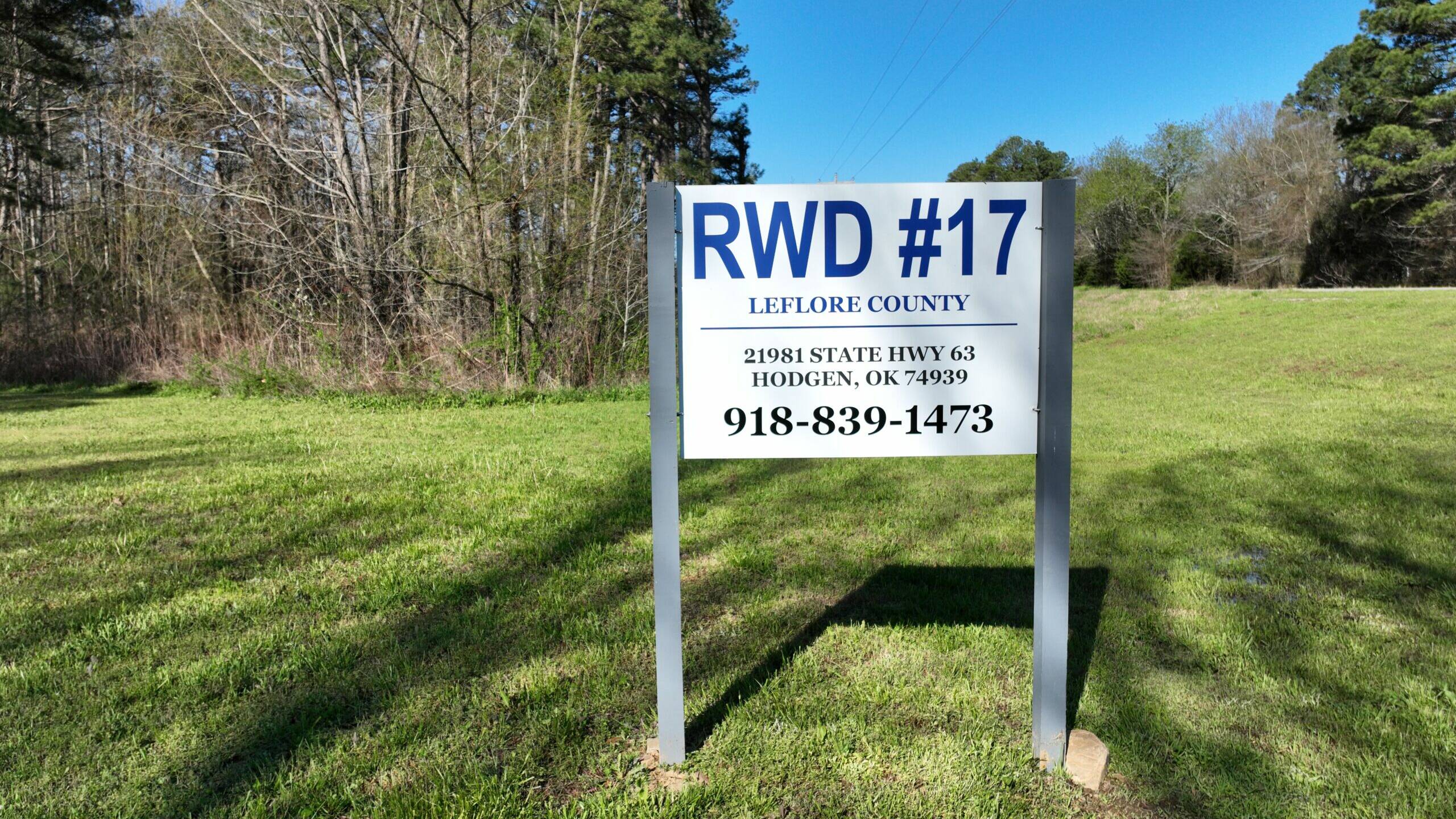Down in southeast Oklahoma lies the quaint community of Big Cedar. Nestled amidst the picturesque Ouachita Mountains, this small community in southern LeFlore County harbors the remarkable tale of resilient Rural Water District No. 17.
Back in the beginning, RWD#17 LeFlore County was constructed in 1999-2000, funded by a grant courtesy of the United States Department of Agriculture-Rural Development (USDA-RD).
However, during construction, an injured Oklahoma RD State Engineer left one engineer to oversee all state engineering work, including inspections. The project engineer, located four hours away from LeFlore, made only monthly visits. Despite concerns about the substandard installation of the water line, the project inspector, under threats from the contractor, approved the work.
The governing board, USDA, and the project engineer discussed the issues and recommended appointing someone to accompany inspections and document findings during pressure-testing of the line.
John Butler had recently moved to the area. Also, a concerned system member, Butler volunteered to take on the role. He used a digital camera and snapped photos of the line that was exposed, verifying the report that the line was being backfilled with rock.
With help from his wife Deborah, who has a background in forensic financial accounting, the two compiled the information into a written description of what was found at each location, and those locations were clearly identified.
With the evidence that John Butler provided, the system’s attorney filed a lawsuit against the contractor and the bonding company. The system was successful, obtaining a settlement which the bonding company paid, helping the district pay off the USDA-RD loan and becoming debt-free in the process.
“Together we were able to help the attorney put together a good case and the district was awarded the settlement,” said Butler, who had previously served as the water operator from 2000-2003.
Funds from the settlement were also used to purchase the office property and a backhoe to use in making repairs. However, over the years, many areas of the water line were found to be leaking.
The system fell into poor condition again as the board seemingly lost hope and interest. Customers lost confidence in the system and from the start there were some that wanted water but didn’t want to pay.
“The (old board) didn’t put the money that we had received into the water line like I had thought they should and so I resigned,” Butler said. “I felt strongly that they needed to put the money into the line because I knew how bad it was.”
At that time, things were so grim that the LeFlore water department office had been abandoned. Papers were stacked on the floor, in boxes, and in the attic.
After years of apathy and abandonment, RWD#17 LeFlore was served a Department of Environmental Quality (DEQ) Court Consent Order to improve the water quality, or they would be fined by the state.
But everything changed in 2020.
A group of concerned customers with business experience were elected to the board. That board started by earning a grant for an engineering report and a hydraulic analysis to determine what LeFlore needed to make improvements on the water line.
Local churches began to pray for the water department. Public awareness helped break apathy and build public support. Back at the office, volunteers stepped up and properly sorted all the records.
All board meetings were digitalized from 1998 to forward. Records from 2018 going forward were filed in binders or locked file cabinets while being digitalized and filed on Dropbox by year and category. The board purchased QuickBooks and built financials from 2018 to date.
The board did a complete re-write of By-Laws, secured new User Agreements and easements from all current property owners, and requested three rate studies to determine the best option for the district after learning water supplier rates would increase.
After two decades, the new board also pursued and eventually re-hired Butler who returned to work as the system’s water operator again.

“This board is a lot more forward-looking, a lot more business-minded,” Butler said. “I had a long talk with them before I agreed to come back. I said, you know, I don’t mind doing the work because the work is 24-7, 365 in all types of weather. I’ve got to know that we’re going to do everything we can to make sure that from this point forward we’re putting our money that we have into the line and not into things that we don’t particularly need right now, in my humble opinion. Fortunately, we have a board that was very aggressive about finding and applying for grants.”
The first two grants were an Oklahoma Rural Water Association (ORWA) Rural Infrastructure Grant (RIG) and American Rescue Plan Act (ARPA) LeFlore County grant, allowing the district to replace mechanical meters with an electronic drive-by system.
The funding from a second ORWA RIG grant enabled LeFlore to put the finishing touches on a leak detection system using new valves and flush hydrants. These grants were paramount for LeFlore as water loss was at 50 percent before 2018.
More than half of LeFlore’s water valves, crucial for isolating sections of water line during leak detection, were failing. This year, LeFlore acquired equipment for valve replacement and installed inline meters to pinpoint water distribution versus customer usage.
As a result, the district can now accurately locate main leaks within a searchable distance, prioritize repairs, and eventually replace the deteriorating water lines to ensure future generations won’t face the same issues as today.
“We took our meter reading time from a day and a half down to two hours,” Butler said. “We know in a general sense where the water loss is now.”
Gaylene Riley, Oklahoma State Coordinator for Community Infrastructure at Communities Unlimited (CU), has a long history working with RWD#17 LeFlore. She’s worked with the district since 1998 and has witnessed how the district has faced adversity, overcome the obstacles, and become better because of it.
“They’re on their way to being a sustainable system,” Riley said. “Coming from having limited resources, a system that was aging, and had issues due to the way it was installed, they’ve worked hard to turn this thing around. Everyone needs a LeFlore #17 and a John Butler, where the board is actively pursuing to make things better, and that the operator truly cares and has passion for his work and wants to do things right, so that water lasts for future generations to enjoy.”
LeFlore still needs sizeable funding to restore the system to good working condition. CU’s Lending Team has assisted with applications and facilitated conversations with funders.
Chris Ranniger, Infrastructure Lender at CU, assisted LeFlore by processing an application for matching funds for one RIG, and another for a Pre-Development Engineering (PDE) loan to pay for design for a Drinking Water State Revolving Fund (DWSRF) loan with forgiveness that is pending.
“We’re here to help them fix their leakage problem. They have had a lot of leaks causing them to lose money. We’re helping them with two different loans. One is to install inline water meters and help them to isolate the leaks. And we're doing another bigger project, to help them replace a lot of piping that will hopefully do the same thing, help them isolate leaks, and save money over time.”

— Chris Ranniger, Lending Officer, Communities Unlimited
Currently, LeFlore has 173 active taps, primarily serving a small district with a few businesses. They anticipate growth, particularly with the expansion of nearby Beavers Bend State Park.
This Rural Water Department is already actively preparing to meet the increasing demand to avoid issues experienced by others who had to install water lines.
“We’re trying hard to be prepared because I saw what happened with them,” Butler said. “They put in a water line and had to come back in and put another one beside it just because the demand shot up. Now is that going to happen here? Probably not in my lifetime but it will be in somebody’s lifetime, maybe my operator apprentice’s lifetime and we must be ready for it.”

